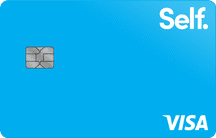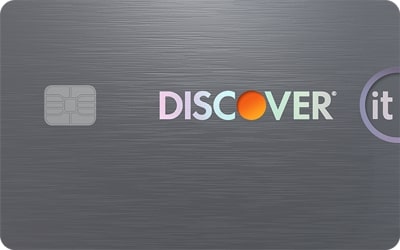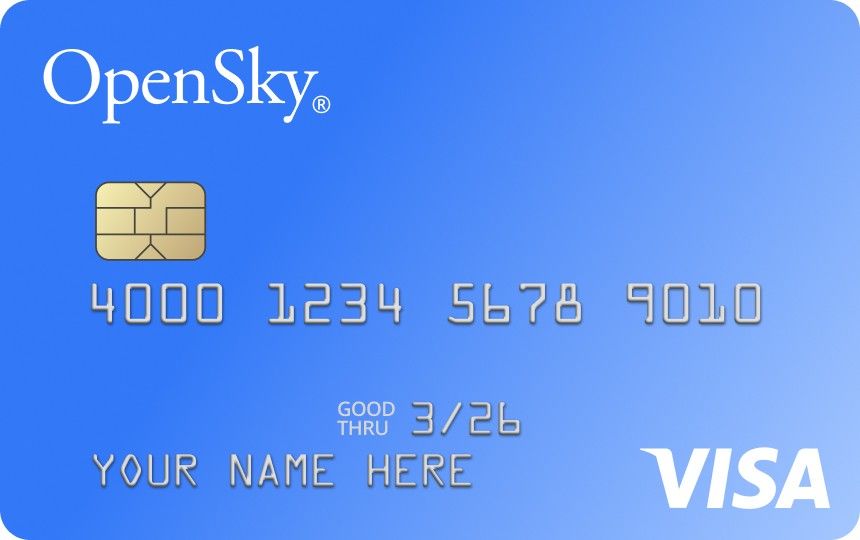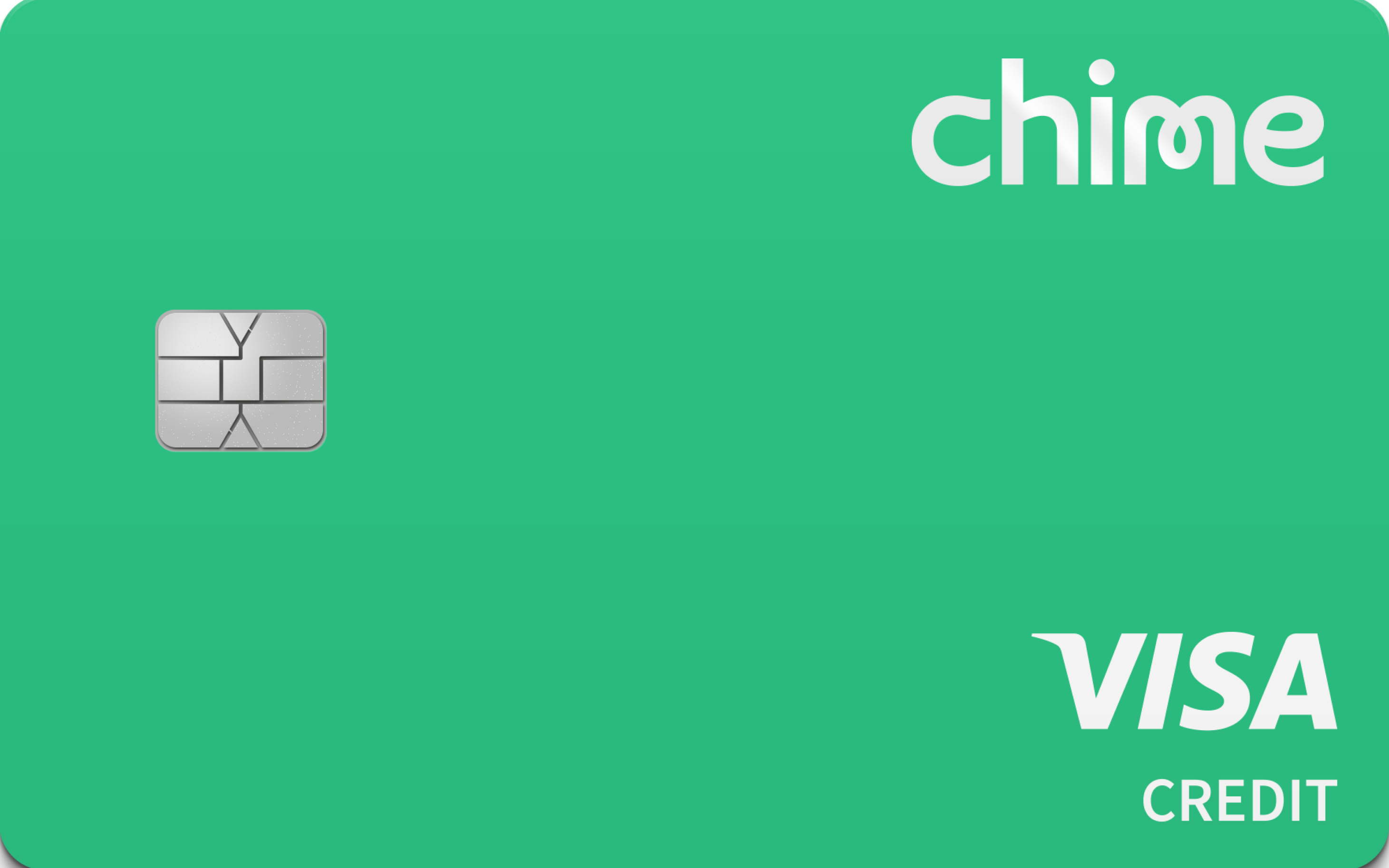Self Visa Review: A Different Kind of Secured Credit Card
4.5
It’s more complicated than traditional secured credit cards and potentially more expensive in the long run. But it offers a unique way to help users build credit.
- No hard credit check required
- Relatively low security deposit
- Annual fee
- Can't get the card immediately
- No rewards

$25
29.24% Variable
N/A
Annual fee
$25
Rewards rate
None
Bonus offer
N/A
Intro APR
N/A
Ongoing APR
APR: 29.24% Variable
Foreign transaction fee
N/A
Compare to Other Cards
Detailed review: Self Secured Visa® Credit Card
The Self Secured Visa® Credit Card, issued by Lead Bank, offers those with no credit or poor credit a unique path to establish a credit history.
Secured credit cards typically require a credit check and an upfront cash security deposit, which can be obstacles for those with bad credit history or little access to immediate funds. The Self Secured Visa® Credit Card works a little differently, allowing you to skip the hard credit check and letting you build up the required security deposit by opening a Credit Builder Account, a secured installment loan necessary for eligibility.
It's an interesting model that can eliminate significant roadblocks to credit for many, but the card has its own hurdles — including an annual fee — that you'll have to clear. And because you can't get the card itself immediately, you'll have to be patient.
Self Secured Visa® Credit Card: The basics
Card type: Secured.
Annual fee: $25.
Interest rate: The ongoing APR is 29.24% Variable.
Bonus offer: N/A.
Rewards: None.
Other fees:
Administrative fee: $9 when you open a Credit Builder Account. This is a one-time, nonrefundable fee.
Late fee: Up to $15 per late payment.
Return fee: Up to $15 per failed payment from a bank account.
Expedited payment fee: $3.50 when you pay your credit card balance with a debit card.
Benefits and perks
No hard credit check or traditional deposit required
Typically when you apply for a credit card, the issuer conducts a hard inquiry that temporarily lowers your credit scores. You don’t have to worry about that with the Self Secured Visa® Credit Card. (The issuer may conduct what's known as a "soft inquiry," but those won't harm your scores.)
And unlike with most secured credit cards, you won't need to come up with a set lump sum ahead of time that establishes your credit limit. Here's why:
The card works in tandem with a Credit Builder Account, which is a secured installment loan that you must take out before becoming eligible for a Self Secured Visa® Credit Card. Though this loan also doesn’t require a credit check, it requires effort on your part and an administrative fee of $9 (this is a nonrefundable, one-time charge).
You'll pay the Credit Builder Account in monthly installments, starting at $25 per month. The installments you pay accumulate in a federally insured certificate of deposit (this will earn interest, but you don't get to keep it). To be eligible to get the Self Secured Visa® Credit Card, you'll need to have saved at least $100 (plus meet a couple of other requirements). In terms of a deposit that is relatively low compared with what other secured credit cards require.
Choose your own credit limit
Once you’ve opened a Credit Builder Account and held it for some time, it might be possible to qualify for the Self Secured Visa® Credit Card if you meet these other requirements:
Saving $100 or more in the certificate of deposit. (This will serve as your security deposit.)
Making three on-time monthly payments.
Maintaining an account that is in good standing, with no outstanding fees.
Once you have the Self Secured Visa® Credit Card, the minimum amount allowed as a security deposit is $100, but you’ll get to choose how much of your savings to put toward it. This amount will determine your credit limit. As with traditional secured cards, you can get the deposit back upon closing the account in good standing.
Accounts in good standing may also have opportunities to increase the card’s credit limit over time. As you make payments on your Credit Builder Account each month, you can choose to increase your credit limit up to a maximum limit of $3,000. Plus, Self considers those who have held a Self Secured Visa® Credit Card for six months or longer for an unsecured credit limit increase. To determine eligibility for an increase, Self performs a soft inquiry that doesn’t affect your credit scores. The company also reviews your income and account management history, among other factors.
You don't necessarily need to have paid off the Credit Builder Account loan to qualify for the Self Secured Visa® Credit Card. You need only to have saved enough in the certificate of deposit and met the card's other criteria (listed above in the bulleted section).
Payment history reported to credit bureaus
When you use the Self Secured Visa® Credit Card and pay the bill, that payment history — which is a large factor in your credit scores — is reported to all three major credit bureaus: Equifax, Experian and TransUnion. Another major factor in your scores is your mix of accounts, and with Self you get an installment loan and a credit card in one model.
Drawbacks and considerations
Complicated credit-building
Your path to the Self Secured Visa® Credit Card is not immediate. You'll first have to open the Credit Builder Account and then work your way up to qualifying for the credit card. And while there are benefits to having two types of credit, juggling the Self Secured Visa® Credit Card and Credit Builder Account loan may seem like a lot of work.
If you want to avoid a wait, and if a larger minimum security deposit isn’t a barrier for you, consider a secured credit card you can get without an installment loan. The $0-annual-fee Capital One Platinum Secured Credit Card may allow for a lower deposit of $49 or $99 for a starter credit line of $200, if you can qualify. The Discover it® Secured Credit Card requires a minimum security deposit of $200, but it offers cash-back rewards that can help offset that cost, along with a path to upgrade to an unsecured credit card. The annual fee is also $0.
There are lower-cost ways to establish credit
The costs of carrying the Self Secured Visa® Credit Card start with the expense of the Credit Builder Account. As an example, a $600 loan you pay back in $25 monthly installments over 24 months will cost you $89 after you factor in interest and the one-time $9 administrative fee. Add to that the card’s $25 annual fee and any interest costs you may incur if you carry a balance. Suddenly, you’re spending as much as you would to get a more premium rewards credit card but without the perks that make the price tag worth it.
Some secured credit cards allow you to build credit with no fees, no interest and no minimum deposit requirement, although they also don't allow you to carry a balance from one month to the next. The Chime Secured Credit Builder Visa® Credit Card and Varo credit card, for instance, require you to open an account with the company that offers the cards. That account is used to fund the security deposit in the amount of your choice. Still, there's no annual fee for these cards.
Chime says the following:
The secured Chime Credit Builder Visa® Credit Card is issued by The Bancorp Bank, N.A. or Stride Bank, N.A., Members FDIC, pursuant to a license from Visa U.S.A. Inc. and may be used everywhere Visa credit cards are accepted. Please see the back of your card for its issuing bank.
To apply for Credit Builder, you must have received a single qualifying direct deposit of $200 or more to your Checking Account. The qualifying direct deposit must be from your employer, payroll provider, gig economy payer, or benefits payer by Automated Clearing House (ACH) deposit OR Original Credit Transaction (OCT). Bank ACH transfers, Pay Anyone transfers, verification or trial deposits from financial institutions, peer to peer transfers from services such as PayPal, Cash App, or Venmo, mobile check deposits, cash loads or deposits, one-time direct deposits, such as tax refunds and other similar transactions, and any deposit to which Chime deems to not be a qualifying direct deposit are not qualifying direct deposits.
Based on a representative study conducted by Experian®, members who made their first purchase with Credit Builder between June 2020 and October 2020 observed an average FICO® Score 8 increase of 30 points after approximately 8 months. On-time payment history can have a positive impact on your credit score. Late payment may negatively impact your credit score.
On-time payment history may have a positive impact on your credit score. Late payment may negatively impact your credit score. Chime will report your activities to Transunion®, Experian®, and Equifax®. Impact on your credit may vary, as Credit scores are independently determined by credit bureaus based on a number of factors including the financial decisions you make with other financial services organizations.
Money added to Credit Builder will be held in a secured account as collateral for your Credit Builder Visa card, which means you can spend up to this amount on your card. This is money you can use to pay off your charges at the end of every month.
Out of network ATM withdrawal and over the counter advance fees may apply. See here for details: https://www.chime.com/chime-credit-builder-visa-credit-card-agreement/
Determine your credit limit by setting money aside in your Chime Credit Builder secured account. From there, you can spend what's in your account, and the bill is automatically paid each month. The card charges no interest, as you must pay your monthly bills in full.
How to decide if it's right for you
The combination of an installment loan and a credit card can help you establish credit, but having both types of credit can increase your costs, especially if you’re also paying interest charges on the Self Secured Visa® Credit Card. So you’ll have to determine whether it's a worthy investment for your credit-building journey.
Other cards for bad credit or no credit are possibilities, too, if you’d prefer greater simplicity and lower fees. The trade-off would be having to make a higher security deposit upfront.
Methodology
NerdWallet reviews credit cards with an eye toward both the quantitative and qualitative features of a card. Quantitative features are those that boil down to dollars and cents, such as fees, interest rates, rewards (including earning rates and redemption values) and the cash value of benefits and perks. Qualitative factors are those that affect how easy or difficult it is for a typical cardholder to get good value from the card. They include such things as the ease of application, simplicity of the rewards structure, the likelihood of using certain features, and whether a card is well-suited to everyday use or is best reserved for specific purchases. Our star ratings serve as a general gauge of how each card compares with others in its class, but star ratings are intended to be just one consideration when a consumer is choosing a credit card. Learn how NerdWallet rates credit cards.
Frequently asked questions
Yes, the Self Visa credit card is a secured card that’s accepted wherever Visa cards are accepted in the U.S.
The minimum credit limit is $100. As you make payments on your Credit Builder Account each month, you can choose to increase your credit limit up to a maximum limit of $3,000. Plus, Self considers those who have held a Self Visa card for six months or longer for an unsecured credit limit increase.
You must first open a Credit Builder Account, which is a secured installment loan. The installments you pay accumulate in a federally insured certificate of deposit that earns interest until the term ends and the loan is paid off. Once you save $100 or more in the certificate of deposit (which will serve as your security deposit), make three on-time monthly payments and maintain an account that is in good standing, you may qualify for the Self Visa.
If you’ve held the card for six months or longer, Self will consider you for an unsecured credit limit increase, which would make the card a partially unsecured card.
Because you’ll have an installment loan and a credit card at the same time, the Self Visa can help you build credit if you make on-time payments and otherwise use the card responsibly. However, the card charges an annual fee and interest if you carry a balance, and you’ll also owe a fee and interest on the installment loan.




